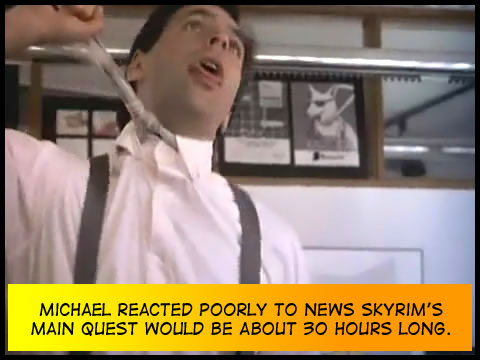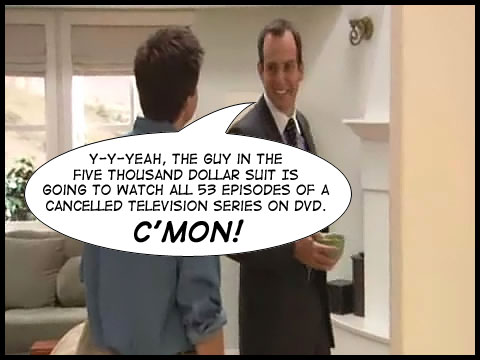How long should a game be?
Six hours? Sixty?
What is the right length?
As with the related questions, “How much should a game cost?” and “How costly should a game’s development be?”, the issue is nowhere near as simple as it appears on the surface and the article purporting to reveal the truth of the matter is somewhat suspect as it gives disproportionate weight to the truthiness of some truths while overlooking other inconvenient truths.
The short answer to the question is the standard shifty-eyed, feet-shuffling evasion: “Well, it depends.” The long answer boils down to the same thing but it does at the very least bring up some interesting discussion points along the way to the same unsatisfactory conclusion.

(Source.)
One of the many odd things about games is their relative length. Songs take less than four minutes on average, comic books tend to be 22–page romps, episodic television is about 44 minutes a week and movies run shy of two hours in deference to bladders. The contrast with games is jarring. RPGs routinely take dozens of hours, a Football Manager campaign can suck up hundreds of hours and an MMO may easily consume thousands of hours. When that’s coupled with the fact the intense, interactive nature of games makes greater demands on the consumer compared to other media, it may seem gaming is an unusually gruelling form of entertainment. It stands to reason gamers would be inclined to play shorter games and just as naturally be unlikely to finish longer games.
And there is indeed a particular segment of the gaming population calling for shorter games now. These were 80s kids who found to their delight gaming was keep pace with them as they grew up because as they became increasingly sophisticated in their taste in the 90s, so did games, which grew in length and complexity. Early adopters and cheerleaders for the medium, they readily self-identified as “gamer” with a connotation of pride absent from “reader”, “viewer” or “listener” when gaming was facing widespread cultural condemnation. These gamers now figure prominently in the gaming landscape as developers, reviewers, pundits and superfans dominating online forums and, perhaps unsurprisingly, have developed a sense of entitlement about gaming.

(Source.)
In recent years, they’ve become increasingly insistent games should continue catering to their own specific tastes. (A typical manifestation of this is adult gamers lamenting the 25-year-old Final Fantasy franchise isn’t as magical and enchanting to them now as it was to their wide-eyed younger selves.) Time-constrained in their thirties, they’re now calling for games to be simpler and shorter because they no longer have the time to devote to the kind of lengthy games they would unhesitatingly point to as some of the greatest gaming experiences they’ve ever had — games like Ultima VII and Baldur’s Gate II, which were inspired by long multi-session tabletop Dungeons & Dragons adventures that in turn took inspiration from epic Tolkien-esque journeys. It is a testament to this self-absorbed generation’s exaggerated sense of self-importance that it’s demanding an entire medium change to accommodate its needs when there is a younger generation with a ravenous appetite for pop culture who might appreciate modern equivalents to Ultima VII or Baldur’s Gate II.
There are others who might benefit from games being shorter. For example, freelance game reviewers who spend 75 hours slogging through a charmless RPG only to be paid the same amount as someone reviewing a much shorter game. Commentators who spend hours on weekly gaming podcasts prattling on about how they just don’t seem to have enough time to actually play games would be another grateful beneficiary.
But are gamers as a whole favouring shorter games now?
Matters become much less clearcut when considering the amount of time gamers are putting into popular games. Take World of Warcraft. This is a 7-year-old game with over 10 million active subscribers and it is essentially an endless treadmill. Three months after its release, Elder Scrolls V: Skyrim continues to be among the best-selling games on Steam as well as among the digital distribution service’s most-played games. This is not a short game either. Now, two games with well-honed compulsion loops don’t make a trend but it does make confident declarations “gamers actually want shorter games” seem specious.
Commentators in favour of shorter games bolster their argument by smugly pointing to the fact only 48.4% of players finished Portal, a game that could be feasibly completed in less than three hours. Yet that particular situation is not as simple as it may seem either. Portal was given away twice in one of Valve’s trojan horse attempts to build up the Steam userbase so a whole bunch of people got Portal without really having any great desire to play it because, hey, free cake! Is it any great surprise these freeloaders didn’t finish the game? Interpreting stats haphazardly without zooming out to see the bigger picture is not going to convince anyone.
Zooming out does raise another interesting question: why aren’t gamers finishing their games? The simple-minded will suggest adult gamers must be too busy to play them to completion and, on the face of it, that sounds perfectly plausible. But going by that rationale, those time-constrained adult gamers must also be clamouring for 20-page novels, trailer-length movies, jingle-length songs and television series with fewer episodes. (Not to mention snippily replying “tl;dr” to every long-form article bemoaning game length.)

(Source.)
That isn’t happening, is it?
If it cannot be stated with any certitude gamers want shorter games, what do they want?
What gamers want, what they cannot get enough of, is quality gaming.
If gamers protest what’s perceived as an abbreviated gaming experience, what they’re actually saying is they’re disappointed a great gaming experience has come to an end prematurely. They’ve not had their fill yet. They want more. Encore! Encore!
(The use of DLC, usually maligned as cynically exploitative when gamers feel short-changed, would be warranted in this particular scenario if it extended the experience through additional levels, missions and storylines. The caveat is the DLC must sustain the quality of the main game.)
Quality, or rather the lack thereof, probably explains why gamers aren’t finishing some games as well. The game simply isn’t good enough. And once again, digging deeper into the whys and wherefores might prove illuminating. If thirtysomething gamers don’t finish games pandering to a prepubescent going apeshit demanding his chocolate milk (read: his idea of a whole lot of fun), perhaps assuming games must be shorter isn’t the greatest takeaway. There could be other solutions to consider. If that thirtysomething adult can devote hours to a book or television series, why not a game? What experiences are those media providing that games are not? Perhaps aiming for game experiences outside that narrow spectrum ranging from childlike wonder to adolescent fantasy is the answer to maintaining the interest levels of a thirtysomething adult over the course of several hours.
But asking what gamers want isn’t the best tack to take when considering game length because there are other parties with a vested interest in seeing shorter games and these parties actually have a direct say in the matter.

(Source: Sam Fox Photography.)
Although the blame for most of gaming’s problems could easily be laid at the feet of gamers, in this case it’s best to turn the spotlight back on game makers to find the root of the issue. It’s difficult to shake off the suspicion developers are being disingenuous when they claim gamers crave shorter games because the loudest calls for shorter games are coming from developers themselves.
(Disingenuity comes easily to a particular type of game developer who will piss down your leg and grandiloquently proclaim April showers bring May flowers.)
To really understand why game length is a hot topic these days, one need only consider what Robert A. Kotick, the man who epitomises the modern gaming industry, really wants. The one-time teenage hustler from Long Island now hustling the gaming industry, Bobby Kotick is the CEO and President of Activision Blizzard and a man who, depending on whom he’s hustling at the moment, either has no interest in playing games or loves games. What is indisputable, however, is he truly, madly, deeply loves exploiting games. Kotick wants games with “… the potential to be exploited every year across every platform with clear sequel potential that can meet our objectives of over time becoming $100 million plus franchises …” In other words, he wants shorter development cycles and the best way to achieve that is to make shorter triple-A games.
Thus, the issue is still essentially a question of time but time as it relates to money. If there’s one truism to be found in this age of high-definition gaming, it’s that developers are killing themselves creating multiplatform triple-A blockbusters. These games may be getting shorter in general but perversely, they require more developers than ever before. The last Modern Warfare game, for instance, took three studios to develop: an Infinity Ward gutted after departures by developers tired of Kotick treating them like chattel, Sledgehammer and Raven. If things continue on this trajectory, gamers might soon see the day when a triple-A game’s credit sequence is longer than its gameplay.
Having successfully cultivated a younger generation of gamers who naively conflate graphics quality with quality gaming experiences — gamers who are now demanding next-generation consoles for that misguided reason — the gaming industry finds itself increasingly hard-pressed to live up to lofty expectations as development costs spiral out of control and the pressures of delivering blockbuster experiences as quickly as possible take their toll on developers. It’s one of the many traps the industry has set for itself at the triple-A level and seeing the danger that lies ahead, developers and publishers are understandably desperate to wean gamers off any expectation games should be long.
However, that merely addresses why game length is a hot topic now rather than addressing the question directly.

(Source.)
So, how long should a game be?
Unfortunately, there is no simple, pat answer to be found so the facile aphorism must suffice: a game should be as long as it needs to be and no longer. If a game needs to introduce complex game rules, develop characters, relationships and narratives in a rich, detailed world with plenty of room for exploration within its gamespace, the game deserves to be long. If a game has a simple point to make, on the other hand, the game should probably be brief. Jason Rohrer took only five minutes to say something profound with Passage (granted, anyone who insists all games must be “whee!”-inducing, cartwheels-inspiring fun is going to disagree) and leave the player squirming over its none-too-subtle questioning of gaming as a pastime while there are big-budget titles that have nothing to say but take eight hours to say it. Yet, the Pollyannaish belief shorter games will result in higher quality gaming experiences doesn’t always hold true either. There are certainly short and sweet experiences to be found on mobile platforms, for example, but they are vastly outnumbered by short and shit games. If long games aren’t necessarily bad, short games aren’t necessarily better.
Thankfully, the gaming market is large enough now to sustain diverse offerings for diverse gaming needs. There’s plenty of room for both the five-minute throwaway game and the epic experience requiring huge investments of time.
In short, “Well, it depends.”
